If you’ve been thinking about going back to school, there may be a lot of questions and concerns swirling around in your mind.

Returning to college may seem tough at first, but it can be a great choice with the potential to make a lasting difference in your life.
Going back to the classroom for the first time in a long time doesn’t necessarily mean starting over from scratch — you may be able to use what you already know. Plus, today’s flexible programs, such as online college, make it easier than ever for busy working adults to earn a degree.
How to Go Back to School as an Adult

If you’re asking yourself, “How do I get started if I want to go back to school?” it’s important to know that it’s never too late to complete a college degree. If this is a goal you have, then it’s worth pursuing it. By making a plan and seeing it through step by step, you can work your way toward college graduation.
Once you’ve decided you want to return to school, it’s time to get the ball rolling. Here is a step-by-step guide to getting you started.
Step 1: Identify Your “Why”

To get started, it’s important to figure out what you want to do with your life and how college will help you achieve that goal. Having a clear motive in mind will help encourage you every step of the way.
Knowing the direction you’d like to take your life and career can also narrow down the list of schools you are considering.
Step 2: Consider Your Schedule

How much time can you dedicate to school each week? Knowing this can help you decide whether to enroll as a part-time or full-time student.
It can also factor into the decision between on-campus classes and online programs. Online programs tend to offer more flexibility and allow you to learn on your own time, while on-campus classes follow a more rigid schedule.
Step 3: Pick a Major and Research Schools

You’ll want to choose a college program that will help you achieve your career goals, so it’s important to research the degrees or credentials you need for your intended job.
Step 4: Talk to Admissions Pros

College admissions counselors can answer your questions about a school and provide valuable insights into its admission requirements.
For example, you may need to take a placement test once you’re accepted. Placement tests are meant to evaluate your math, reading, and writing abilities to help determine which courses to start you off in.
If you’re headed to graduate school, you may be required to take different tests. This is why it’s important to talk to admissions pros and figure out what exactly is required of you.
Step 5: Apply for Admission

Applying to college is fairly straightforward, but you may be confused about which application process to use. What is the difference between a first-time student and a transfer student?
- First-time student: You are a first-time student if you have a high school diploma or GED and no college experience or college credits. Once admitted, you will be considered a freshman.
- Transfer student: If you attended and earned credits at a college after graduating from high school, then you are a transfer student. The number of college credits you can transfer in will determine whether you are admitted as a freshman, sophomore, or junior.
Whether you are a first-time student or transferring to a new school, the admissions office should be able to help guide you in the right direction to make the application process easy.
Step 6: Test Out of as Many Classes as Possible

In addition to transferring credits, you may also be able to skip ahead in your degree program by testing out of certain courses or coursework. You can check with your school’s admissions office to see if they accept exam credits and how many.
Students who take advantage of this “test out” option typically only do so for a class or two, but many schools will allow up to 30 credits. CLEP is the most well-known, widely accepted testing program. Your school may also accept credits from DSST or Excelsior exams.
Step 7: Start the Financial Aid Process
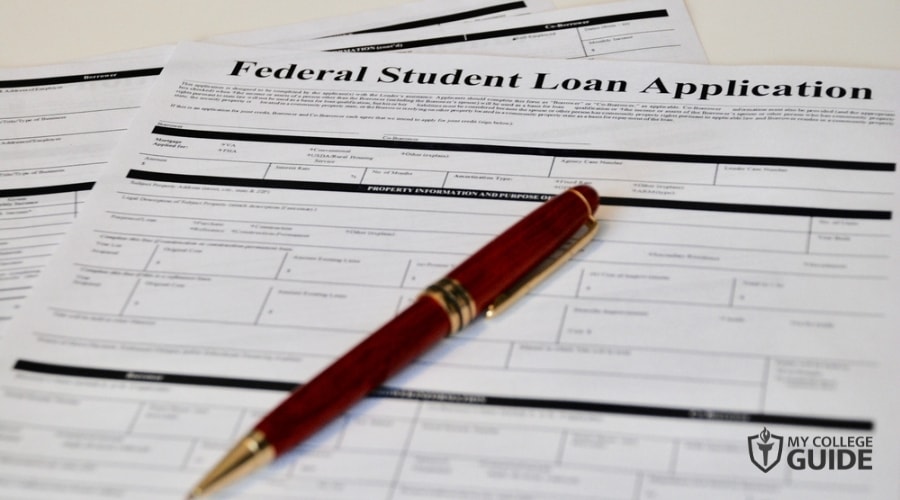
Loans, grants, and scholarships can make a big difference in the affordability of college, so it’s very beneficial to complete the Free Application for Federal Student Aid (FAFSA).
You can file your FAFSA starting on October 1 of the year before you plan to attend college.
Aid is awarded on a first-come, first-served basis, so it’s important to get your application in right away. The FAFSA can help open the door to grants for older adults returning to college and scholarships that do not have to be repaid, as well as low-interest student loans that are not necessarily income based.
Step 8: Submit Applications

Now it’s time to submit applications to the schools that made your shortlist in order to officially apply. At a minimum, that means filling out a form and submitting school transcripts.
Some schools have additional requirements as well, so it’s important to talk to admissions counselors or research each school’s various requirements online.
Step 9: Pick Your School

After the application process is completed, you’ll start to receive decision letters. After you’ve received acceptance letters, it will be time to make your final decision.
When deciding which school to choose, it’s important to consider the majors offered, your schedule, and your financial situation. Once you’ve made your decision, you can begin the enrollment process.
Step 10: Register for Classes

When registering for classes, it’s necessary to pay close attention to your academic plan. A full-time course load is between 12 and 15 credits per semester, and since many courses are assigned 3 credits, you’ll likely be taking 3 to 4 classes at a time as a full-time student.
A part-time course load can vary but is often around 6 credits per semester. Some of the above steps are discussed in more detail below to help you with your decision. Before you know it, you may be taking your first class and working toward a new degree.
Choosing a Major

As you consider majors, it can help to think about the actual jobs associated with those majors and whether or not they appeal to you. As an adult learner, there are so many options available to you—a wide variety of majors, schools, degree levels, learning formats, and more.
If you’re ready for a new field, you may be asking, “What should I go back to school for?” You’ll need to think about your strengths and weaknesses, what type of work environment you prefer, how much flexibility you desire, and so on.
If you’re going back to college to advance your current career, chances are you already have a major in mind. In this case, you can take some time to consider what skills are necessary for the role you’d like, such as managerial or financial know-how, and plan to take classes that will focus on those areas.
Here are some top in-demand fields that might be worth your investment according to data provided by the U.S. Bureau of Labor Statistics (BLS):
Healthcare
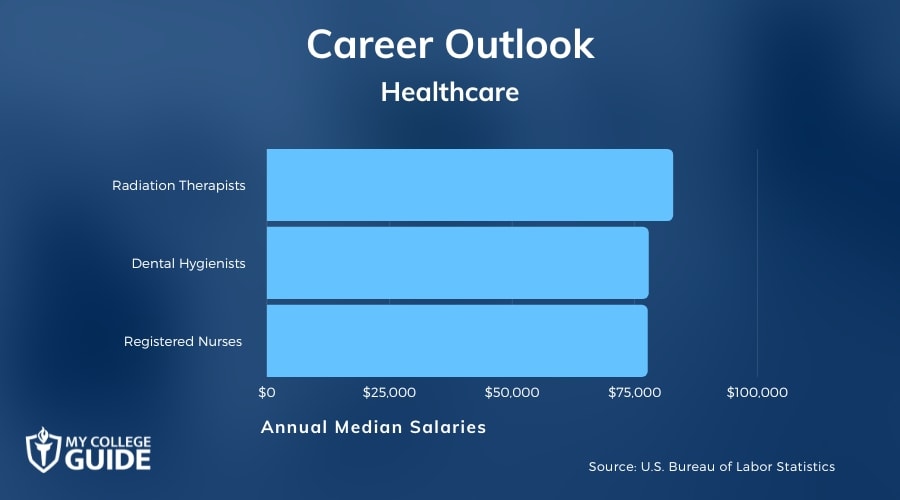
Employment in the field of healthcare is projected to grow 13% over the next 10 years, adding about 2 million new jobs. With an aging population and new medical discoveries every day, this field is expected to grow more rapidly than the average for all occupations.
Some careers you might consider in this field are:
| Careers | Annual Median Salary |
| Radiation Therapists | $82,790 |
| Dental Hygienists | $77,810 |
| Registered Nurses | $77,600 |
The field of healthcare may not only be rewarding because you can help others. It may be lucrative as well.
Technology
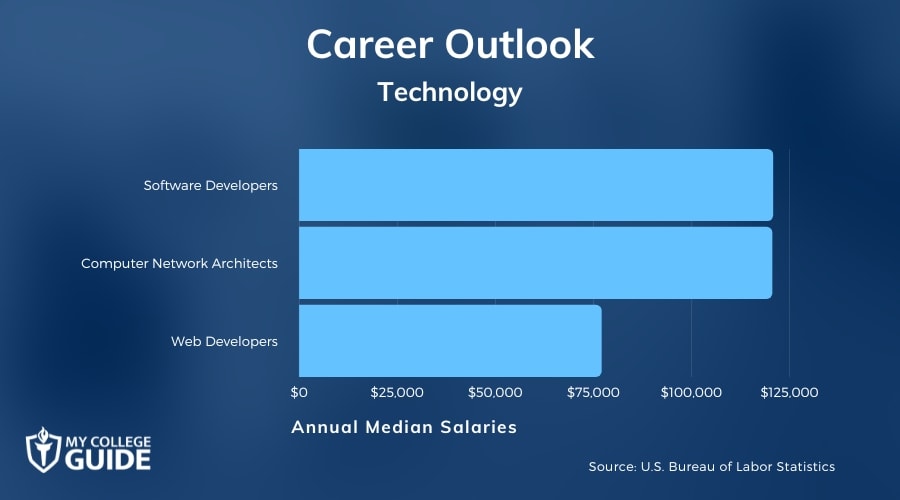
Information security, data collection, and cloud computing are on the rise, which means employment in computer and information technology is booming. The field is projected to grow 15% over the next decade.
Here are a few careers in this field you might consider:
| Careers | Annual Median Salary |
| Software Developers | $120,730 |
| Computer Network Architects | $120,520 |
| Web Developers | $77,030 |
The field of technology can give you opportunities to use your creativity while coming up with the latest advancements. If this sounds like something you’d like, technology may be a good choice for you.
Finance
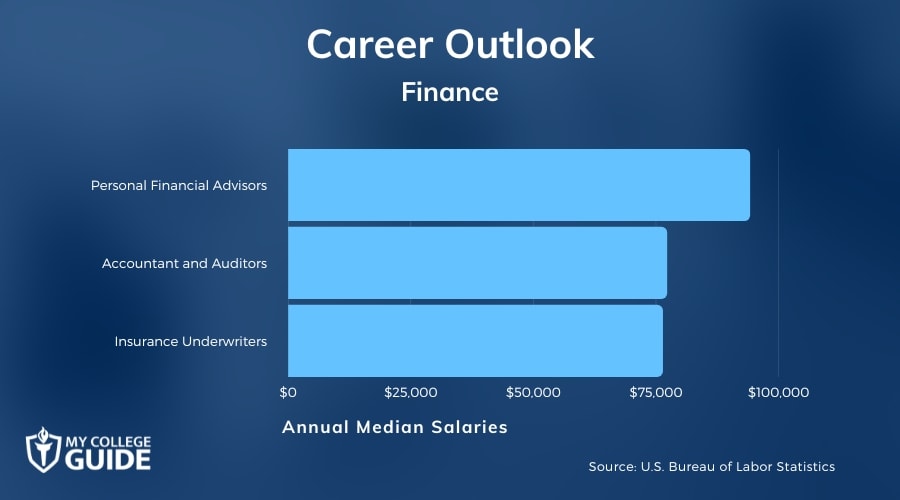
Business and financial occupations are expected to grow 7% over the next 10 years. This is due to many factors, including globalization, a growing economy, data and market research, and so on.
Examples of occupations you might consider in this field are:
| Careers | Annual Median Salary |
| Personal Financial Advisors | $94,170 |
| Accountant and Auditors | $77,250 |
| Insurance Underwriters | $76,390 |
While healthcare, technology, and finance are some of the most in-demand fields, that does not mean it’s not worthwhile to pursue a degree in something else.
Employment is expected to rise in education, law, media, social sciences, and so many other fields. It is important to keep in mind that some employers may look for a bachelor’s degree or higher for certain occupations.
In addition to researching the projected growth and income potential, considering your work history, educational background, and your own personal interests can help you decide which field is right for you.
Choosing a Degree Level

Knowing the field and career you are pursuing will help you determine what degree level you should pursue.
There are 4 college degree levels:
- Associate degree: This degree typically requires the completion of 60 credit hours and can usually be earned in approximately 2 years of full-time study. It can help qualify you for entry-level jobs in some fields. An associate degree is not a required prerequisite to earning a bachelor’s degree.
- Bachelor’s degree: This degree typically requires the completion of 120 credit hours and can usually be earned in approximately 4 years of full-time study. It can help qualify you for entry-level or management positions, depending on the field.
- Master’s degree: This degree usually requires about 1 to 2 years of full-time study beyond the time it takes to earn a bachelor’s degree. Earning a master’s degree can help qualify you for advanced or executive-level positions.
- Doctoral degree: Earning this degree usually takes about 3 to 5 years of full-time study beyond what it takes to earn a bachelor’s degree, and it may require earning your master’s degree first but not always. Earning a doctorate can help qualify you as a field expert to work in business or research or as a college professor.
The most commonly pursued degree is a bachelor’s, but which degree is right for you depends on your goals. You can try searching the U.S. Department of Labor’s Bureau of Labor Statistics website for the career you’re considering to find out what type of degree is necessary.
Choosing a School

This time around, you probably don’t have a guidance counselor, parents, or teachers to help you sort out your options, so you’ll likely need to do your own research when choosing a school.
Here are some factors that are important to consider when choosing a school:
- Major: You can start off by making a list of accredited schools that offer the major you’re interested in.
- Scheduling: Next, you can narrow the list down based on how and when you’re able to attend classes.
When thinking about scheduling, it may be helpful to ask yourself these questions while you research:
- Do they offer fully online degree programs?
- Do they offer night or weekend classes?
- Do they offer online classes?
- Will you have access to the library, computer services, advisors, and professors during hours that work for you?
Finding a school that fits into your lifestyle will make it easier for you to attend, get involved, or keep up with coursework.
- Cost: Next, you can compare the costs associated with each option.
It’s helpful to consider the following questions when comparing the costs of various schools:
- What is the tuition?
- What other fees may come up?
- What is the payment schedule?
- What financial aid, scholarships for adults, or grants for going back to school are available?
- Are there any incentives for adult learners?
- Duration: It’s important to figure out how long it will take to earn your degree as well.
It’s important to keep the following questions in mind when researching how long your degree will take:
- Will your existing credits transfer?
- Can your work experience be used as credit?
- Are there accelerated courses or programs to help speed up the process?
Transferring Credit

Before choosing a school and program, you will need to take an inventory of your previous college coursework.
If you’ve attended college previously or earned college credits in some other capacity, transferring those credits can help you graduate faster and at a lower cost. You’ll just need to have your transcripts sent from your former school to your new one.
To request your college transcript, you can typically:
- Visit your former school’s website
- Use the site’s search tool to search for “transcript”
- Follow the steps provided by the school to request your transcript, which usually includes filling out a short form and paying a small fee
You will be asked for some information, such as your social security number and where you want to send the transcripts, and there may be a small fee (usually under $20).
There’s a good chance you will be able to complete the entire request online using an electronic signature, but some schools will ask that you contact the registrar’s office and provide a paper request and signature.
If your transferred credits are coming from another regionally accredited university, most colleges will accept them. General education credits (English, math, history) tend to be the most transferable, but many other courses will transfer as well, even if only as elective credits. Each school will have its own credit transfer policy.
To find out the credit transfer policy at your chosen school, you may check the following resources:
- The school’s course catalog
- The school’s website (try searching for keywords such as “transfer credit” or “transfer policy”)
- The registrar’s office
Sometimes there is a time limit or a limit to the number of credits schools will accept. They may also refuse credits earned at non-accredited institutions. If your field of study is rapidly advancing, such as the fields of computer science or nursing, they may require you to repeat some classes to ensure your skills are up to date.
Once your new school has reviewed your transcripts, it will let you know how many of your credits are transferable. If certain credits are refused, you have the right to question the decision. You may need to provide a syllabus or other class materials to support your argument.
On-the-job experience related to your major may also be eligible for up to 30 credit hours, depending on the school’s policy. It’s beneficial to mention any professional accolades, credentials, licenses, or training you have that may allow you to skip certain courses.
When Is the Right Time to Go Back to School?

One of the first things you may want to consider when going back to school is your availability. You’ll have to make time each week to attend classes, do the readings, and complete the assignments. If you have free time in your schedule, then you may be a good candidate.
It can also be very beneficial to have support. You may need others to pick up the slack when coursework consumes your attention, and it’s great to have encouragers in your corner.
One of the biggest indicators of success is a student’s support system. If you choose to go back to college, there will be an adjustment period and bumps along the way, but a good support system can help you succeed.
Finally, it can be very helpful to take stock of your motives. Without a plan in place, it’s easy to lose steam halfway through school. If you can clearly articulate why you’re going to college, then this may be the right time to do so.
Going Back to School at 25

Maybe you feel like you’ve missed the boat. Perhaps many of your classmates went straight from high school to college, and now they’ve earned their degrees and settled into professional careers. You may wish you’d followed that path and might even feel like it’s too late.
Well, chances are, if you do go back to school. you won’t be sitting in a classroom full of 18-year-olds.
According to the National Center for Education Statistics, 12 million college students are under the age of 25, and around 7 million students are 25 and older.
At 18, many are still adjusting to their newfound freedom and may have trouble prioritizing coursework. At 25, you’ve likely been on your own for a while, holding down a job and paying bills. You can likely multitask, prioritize, and focus better than you could at 18.
Cost may be another worry for you as a young adult. College costs can be intimidating, but no one expects you to pay upfront. You can start out by completing the Free Application for Federal Student Aid (FAFSA), which will determine which grants and loans you’re eligible for.
Because you’re over 24, you will be able to fill out your FAFSA as an independent student, meaning you won’t have to include your parents’ financial info. This should help paint a more accurate picture of what you are truly able to afford.
In addition to grants, the FAFSA can help you qualify for low-interest loans. You do not have to accept the loans you are offered. Federal aid through the FAFSA isn’t your only resource. You can look for scholarships for adult learners or in your major using search sites like Fastweb.
It can also be very helpful to communicate your circumstances and needs with the school you are applying to so they can help you find the aid you need.
Lastly, if you plan to work while going to school, you can ask your employer about tuition assistance programs.
If flexibility in your schedule is important to you, you may want to consider getting your degree online. More and more accredited colleges and universities are offering online classes and complete degree programs that can allow you to virtually “attend” classes when it’s most convenient for you.
Going back to college at 25 may be a challenge, but you will likely have many years to enjoy the benefits that come from having a college degree.
Going Back to School at 30

Adulthood has a way of sneaking up on people. It may seem like you’re on an express train, traveling full speed ahead. If you’re considering veering off in another direction, it’s important to speak up.
Are you headed in the right direction? Are you prepared for what’s ahead? Can the career you’ve chosen support the lifestyle you desire for your family?
Going back to school at 30 to ensure a better future is not uncommon. You may choose to get a more advanced degree in the field you’re already in or transition into something new. Either way, it may be possible to get college credit for the work experience you already have under your belt.
You probably cannot put your job, spouse, or children on hold to pursue a degree, but online learning can help you work around those commitments. Rather than needing to be in class at a certain time each day, you can log on to complete course materials at your convenience.
Online learning is also often the fastest and cheapest option.
When you’re ready to start your journey, you can consider completing the FAFSA, which will identify the grants and loans you’re eligible for.
You may qualify for funds that do not have to be repaid, and the federal student loans that do have to be repaid typically have lower interest rates and more flexible payment plans than any alternative loans.
Scholarships are another great way to fund college, and there are many opportunities available specifically for adult learners.
Federal aid and scholarships aren’t the only help available. It’s important to communicate your needs to your school to see what resources they can offer and ask about repayment plans if that’s something you’re interested in.
If you have a job, you can discuss your educational goals with your employer and ask about tuition assistance programs.
Going back to school at 30 is a major decision. It can be a challenge to find the money and add another responsibility to your plate, but finding a career you love that can support your family can help make it all worth it.
Going Back to School at 35

Perhaps you’ve been working in your chosen field for a number of years and now you’ve stalled out. Perhaps you’re not fulfilled in your current position, so you need a more advanced degree to keep moving up within the field. Maybe you want to go back to school and focus on another area of interest.
You may be wondering how. You have adult responsibilities. You may be thinking that you can’t just put everything on hold while you “re-do” your education.
First of all, you don’t have to think of it as starting over, but rather as refocusing.
The years you’ve spent in the workforce have not been a waste. You can speak to an academic advisor about how that experience may be turned into college credit. It’s important to mention any additional expertise you have that may allow you to test out of classes or coursework.
Secondly, you will not need to completely disrupt your life to go back to school. You can consider enrolling in an online degree program that can help you fit college around your existing commitments. Online courses are often accelerated to help you finish faster, and they typically cost less than attending on-campus classes.
Cost is often a factor in returning to college. You can start out by completing the FAFSA, which will identify which grants and loans you’re eligible for. The federal student loans offered to you will likely have lower interest rates and more flexible payment plans than alternative loans.
If you aren’t comfortable taking out student loans, you can ask about your school’s payment plans. If you’re quitting your job to return to college, you can ask the financial aid office to consider that when estimating your income. If you plan to work while in school, you can ask your employer about tuition assistance programs.
Returning to school at age 35 is a big decision. It may be tough to find the money and juggle another responsibility, but getting yourself out of that career rut and into something more rewarding can be worth it in a multitude of ways.
Going Back to School at 40

The devil on one shoulder may be saying, “Who goes back to college at 40? You’ve worked in this field for years and now you want to just throw it all away and start over? You have responsibilities, financial obligations, and loved ones who count on you. You can’t just push everything aside while you chase your wildest dreams.”
But let us speak from the other shoulder. Your past is not a waste, and you are not starting over. Your work experience may count as college credit, and of course, you’ve gained life skills that can be applied to many degree fields.
Yes, you may have to make sacrifices, but your responsibilities will not be shirked. You can continue to work and care for your family while getting an education, especially if you choose to get your degree online. Taking classes online means you can do it when you have the time.
Online classes are typically less expensive as well.
Returning to school at age 40 can be worth it to find a career field that will keep you satisfied until you retire.
Going Back to School at 50

At 50, your children may be grown and out of the house, and you may have more time to yourself. You’re likely learning to focus on yourself again. Now may be the perfect time to go back to school and earn that degree you’ve dreamed about.
Online learning may be intimidating at first, but it can help you avoid busy campuses and strict class schedules. It’s often very flexible, so you can fit your education around your job, family time, and hobbies. It is also usually less expensive than traditional on-campus programs.
Returning to school may involve challenges and sacrifices, but it can be worth it to pursue your dream. You’re doing this for yourself, and it’s never too late to pursue an education.
Accreditation
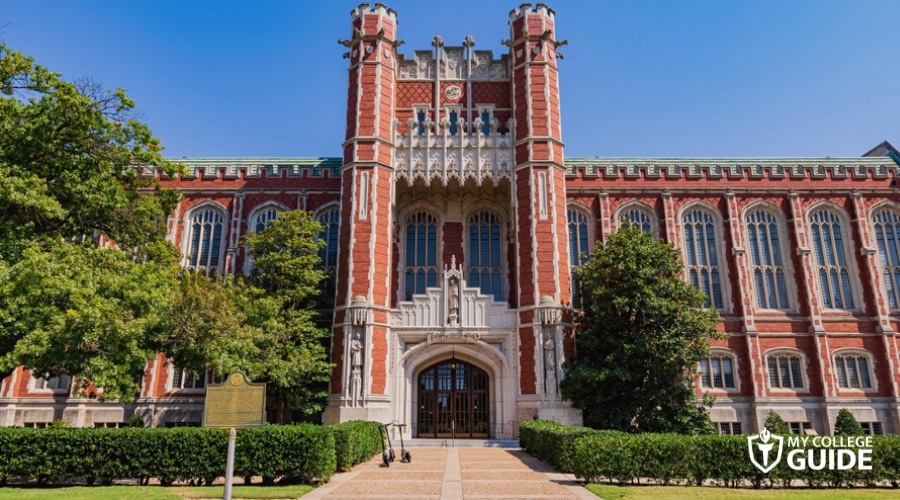
Since you’re making the effort to go back to school, it only makes sense to pursue a degree that will be respected by employers and other colleges. The way to do that is to attend a regionally accredited college.
Regional accreditation is a sign that a school does a good job of providing thorough, reliable education to its students.
Regional accreditation affects the transferability of college credits from one school to another. It can also determine whether you’ll be able to get into grad school someday. An accredited degree may even be the determining factor in whether you get hired for a job.
Paying for College

Cost is often a top consideration for adults going back to college. It’s certainly something to think about, but help is available.
It’s important to familiarize yourself with the various financial aid options available so that you can make a plan for funding your studies. The first step is to fill out the FAFSA form. That’s essential for securing federal assistance and, often, state support too.
Even as a returning adult, you’re eligible to submit this application and possibly receive assistance.
The most likely form of government aid you’ll receive is college loans. Those are widely distributed for both undergrad and graduate programs. Government loans usually carry lower interest rates than private ones.
Depending on your financial circumstances, you may also get a grant, which is money that doesn’t need to be repaid after college.
Grants aren’t the only gift money you might be able to receive. Scholarships could be another option.
When a scholarship comes directly from your school, it’s called an institutional scholarship. Other scholarships are available from all sorts of private organizations, including professional associations, religious groups, community programs, philanthropic foundations, and more.
Getting a scholarship usually requires an application process. There is typically a limited number of awards, so only some applicants will receive the money. You might be chosen based on your life experiences, your academic potential, or another factor.
Employer assistance is sometimes another option for adults returning to school. Workplaces sometimes have funds to cover a portion of their full-time employees’ tuition.
Should I Go Back to School?

Everyone’s situation is different, but returning to school might be the right call for you. If you need help deciding, you can ask yourself these questions:
- Am I open to learning new things? College is all about getting an education and learning from those who know more than you, so it’s helpful to go into the process with an open mind and an eagerness for knowledge. You’ll likely need to be willing to experience new-to-you classroom technology and teaching styles as well.
- Am I ready for a career boost or change? Going to college might be the best way to earn a promotion or break into an entirely new field.
- Can I afford it? College costs vary greatly, but school is never cheap. It’s important to make sure your finances can take the hit, especially if you need to take time off work. Don’t forget to look into financial aid before you make this decision.
- Can I make the time for classes? Online college is flexible, but it does require a time commitment. Even part-time enrollment will likely require several hours of attention each week.
- Do I have a clear plan? Going to college will cost you both time and money, so it’s important to know what you want out of the experience before you begin.
- Do I need a higher salary? College graduates usually earn more than people who only have high school diplomas.
- Is there an alternative? Not every career goal requires a college degree. Industry certificate programs or free online training can be valid alternatives that cost less and achieve similar results.
- Will I be organized? To get the most out of your studies, it’s important to follow the course syllabus, make a study plan, and turn items in on time. Online college requires an extra dose of self-discipline compared to classes where you’re meeting face-to-face with your professors every week.
In addition to asking yourself these questions, you might consider talking to someone who’s recently gone back to school. A firsthand account could be quite helpful.
Pros and Cons of Going Back to School

There are many advantages to enrolling in college, but there can be some drawbacks too. Weighing the following pros and cons can help you decide whether going back to school is right for you.
Pros:
- College degrees often lead to promotions and higher wages.
- Getting to know professors and classmates could help you build your professional network.
- Getting a degree may help you switch careers and may be necessary for some careers.
- Taking classes while holding a full-time job can equip you with new ideas or skills that you can put into practice right away.
- You may be in better shape to succeed this time around. As an adult learner, you may have more maturity to handle a college workload and a clearer vision of what you want to gain from the experience than you did when you were younger.
Cons:
- College can be quite expensive.
- Even with flexible online classes, a significant time investment is required.
- Getting a degree takes time, often a multi-year commitment.
- Online college requires tech skills, organization, and self-discipline.
- You may be able to accomplish your career goals without earning a degree.
If the pros outweigh the cons for you, then you might be a great candidate for going back to school.
How to Know Which School Is Right for Me

Many colleges accept adult learners. These characteristics can help you narrow down the vast selection and settle on the one school that’s best for you.
- Accreditation status: It’s important to pick a regionally accredited school.
- Demographics: You may want to check the percentage of adult learners at a school before choosing it. You might appreciate the environment and support system at a college that focuses on nontraditional students.
- Faculty: You can research a school’s faculty before choosing it as well. You can check to see whether the professors have terminal degrees or firsthand experience in their fields. You might also want to look into whether classes are taught directly by professors or by teaching assistants instead.
- Graduation rate: A high graduation rate is a positive sign. It could indicate that the school works hard to support its learners.
- Online format: Considering factors like term length, live or asynchronous classes, and course pacing can help you choose the best program for you.
- Student supports: Choosing a school with plenty of support for students can help you succeed. You can look for things like online tutoring or social activities for non-traditional students.
- Transfer credit policies: If you’ve done a lot of previous coursework, looking for schools with generous transfer policies can help you graduate faster.
The “best” school is a matter of personal fit and preference, so a school that’s great for other students may not be the right one for you.
Who Should Go Back to College as an Adult?

Regardless of your age, educational background, or work experience, it’s possible to get stuck in a rut. We all want more sometimes.
Going back to school can potentially help you:
- Earn a raise and make more money
- Earn a promotion
- Take on new or different responsibilities at work
- Keep your skills current
- Transition into a new field
- Finish the degree you started
If those are goals you have in your personal or professional life, going back to college may be a great choice for you.
How Does Online Learning Work?

In terms of the actual online learning process, the name of the game is speed and flexibility. Classes are often offered via short 6 or 8 week sessions as a way to expedite your time in the virtual classroom, though some institutions still abide by the more traditional 16 week semester. Others give the option to choose between a standard semester or an accelerated one.
Submitting tests, papers, and other coursework is typically accomplished via an online learning platform. You can usually complete your required assignments at any time, as long as you finish before the due date established by your professor.
Speaking of your professors, interaction comes in a variety of different forms:
- Online discussion boards
- Live chats
- Phone
- Personal meetings (depending on your proximity to the physical campus location)
Typically, your lectures, supplemental downloads, and course-specific digital tools can be accessed within an online learning portal or a specified student server.
Are the Admissions Criteria for First-Time Students and Transfer Students Different?

Yes. The GPA requirement for a transfer student is typically lower because it is presumed that their previous coursework in college was more challenging than the previous work of someone coming from high school.
You can visit your short list of schools’ admissions pages to see which criteria apply to you or make time to speak with admissions counselors who can help you pull together the required criteria. It’s also important to see what each school accepts as transfer credits because this can vary from school to school.
Will My GPA Carry Over?
While you can always check with your desired school, your GPA will typically not carry over when transferring.
When you transfer credits, only the actual credit hours that you completed will transfer, not the grade earned. Your GPA will begin anew as you complete the first classes at your new school. You can use this as a new start or set a goal for yourself to obtain your previous GPA.
Is Going Back to School Worth it?

Yes, going back to school is worth it for many adults. Perhaps finishing college has been a long-term goal of yours. Now could be your time to accomplish it. According to the National Center for Education Statistics (NCES), there are over 6,500 post-secondary institutions in the US.
Getting a college degree could help you start in a new field. It might also be the ticket to advancement in your current line of work. Some promotions or leadership roles require a degree.
You might even be eligible for higher pay. The Bureau of Labor Statistics says that workers with bachelor’s degrees earn an average annual salary of $69,368. That’s compared to $42,068 per year for high school graduates.
Getting Back to School Online

It’s never too late to return to college. Getting a degree might be a personal goal of yours or the key to achieving your professional ambitions. Whatever your reason for going to school, you can make it happen.
Adults going back to school often find success in online classes. It may be easier to fit online coursework into your daily schedule. When you choose to earn your degree from an accredited online college, you can get a respectable education in a format that works for you.
To get started, you can start researching accredited online schools and make a plan for going back to college.
